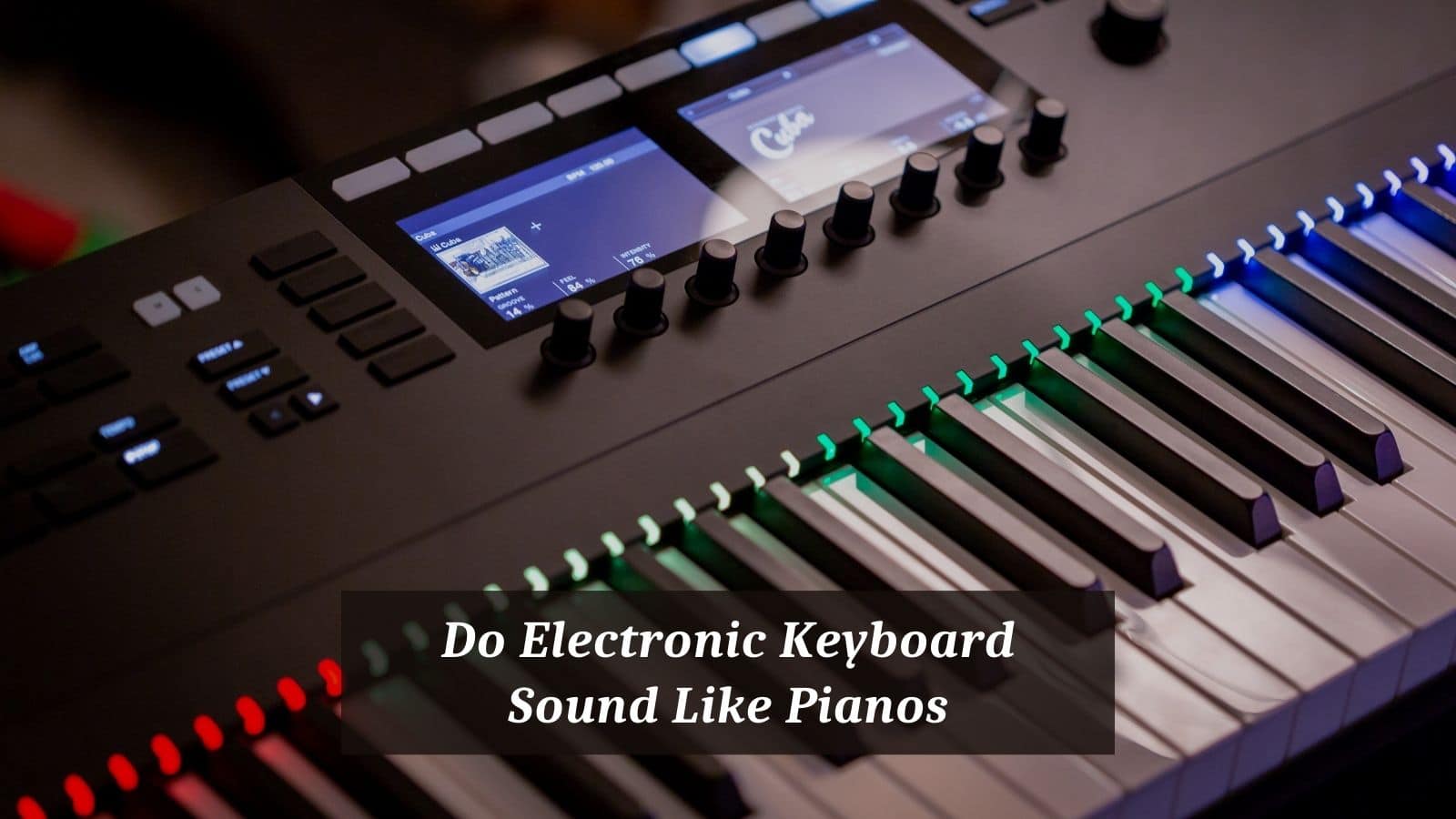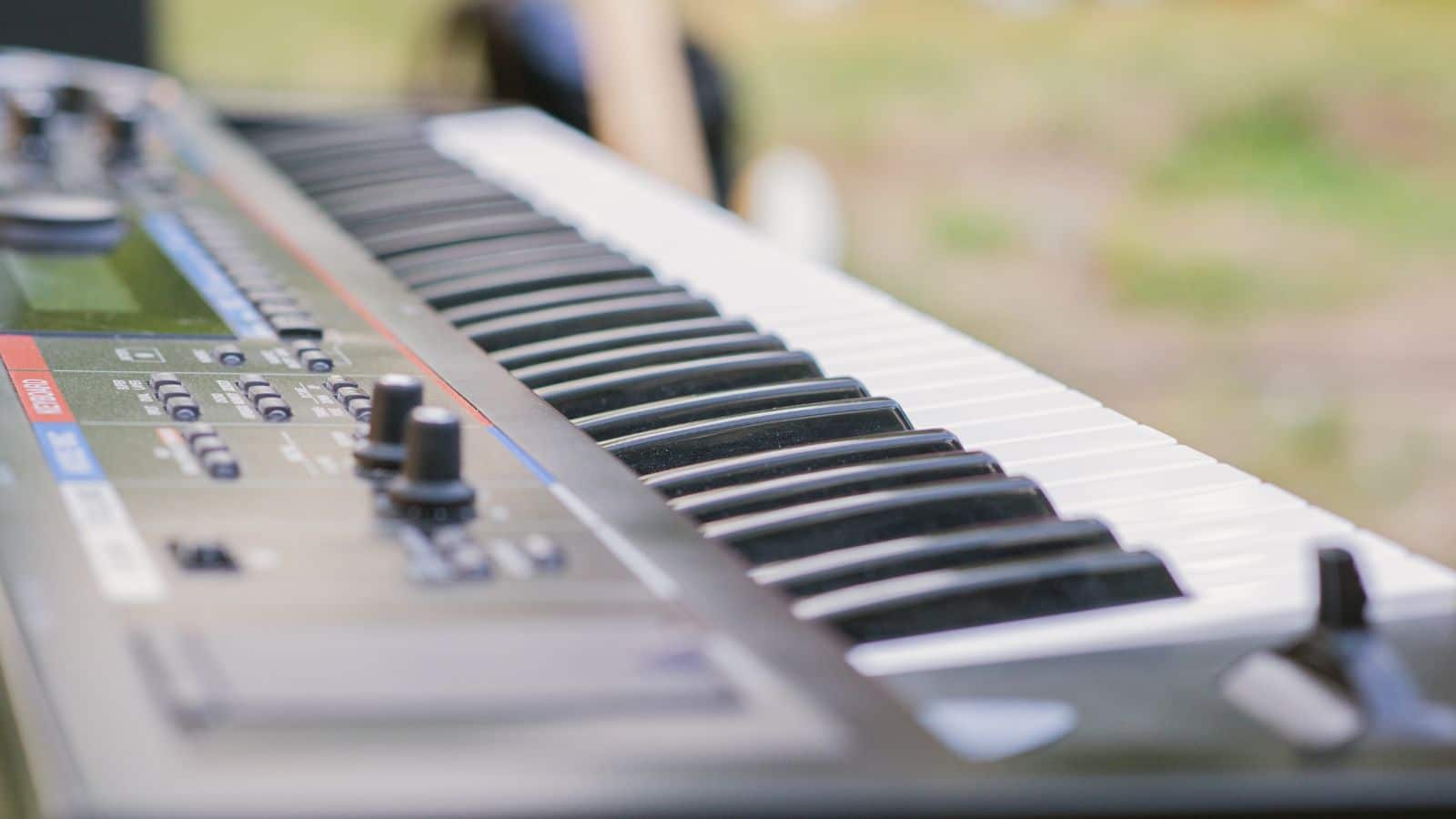
Sometimes we’re faced with a dilemma such as available space in the house, but you really want a piano or start learning to play the piano.
While an acoustic piano is too big for the available space, an electronic keyboard would be perfect because it’s compact, and you can put it away after playing.
The next concern, of course, would be whether an electronic keyboard sounds like an acoustic piano. We’ll answer this question and others regarding electronic keyboards below.
Do Electronic Keyboards Sound Like Pianos?
Let’s start by answering the main question. Before all the technological advances we’ve seen in the last decade or two, keyboards usually got a bad rap for sounding thin, fake, metallic, or nothing like a piano.
Much of this is true because manufacturers did not have the technology to replicate an acoustic piano’s sound perfectly. However, times have moved along, and technology has kept pace.
In short, an electronic keyboard can sound like a piano. Apart from being able to sound like a piano, an electronic keyboard can also have many other instruments sounds like horn, strings, trumpet, drums, and many others.
While a piano produces sound acoustically, hammers strike strings, and the sound is heard without amplification, an electronic keyboard makes sound electronically – played through the speakers.
You cannot adjust the volume on a piano, but you can change the sound on a keyboard using the volume slider or knob.
The key takeaway is that while an electronic keyboard can sound like a piano, it depends on the manufacturer, whether the keyboard is manufactured for beginner or professional musicians, and the sampling rate for the built-in sounds. We’ll look at these factors below.
Choosing an Electronic Keyboard With Piano Sounds — Entry-Level Options
Entry-level or beginner keyboards can produce piano sounds but are distinguishable from acoustic pianos. Entry-level electronic keyboards are the perfect starting point for beginners because they can learn the basics of music and apply them practically on their instrument.
The sound will be very close to an acoustic piano but will unfortunately not have the depth of tone an acoustic piano has. The sounds are almost as natural as those of an acoustic piano.
But beginners won’t be disadvantaged because they can hear what their music sounds like without compromising on practicing and preparing for lessons. The financial benefit is that you don’t have to spend too much on an instrument from the outset.
Performance and Professional Options
Performers and professionals will need much more than just a basic keyboard that emulates the sound of a piano. We’ll all agree that nothing beats the natural tone of an acoustic piano — especially from the player’s standpoint.
That incredibly immersive and personal feeling is one that every pianist will rave about, and it’s a big part of why we fall in love with the instrument.
Keyboard makers have long sought to replicate this feeling by developing ultra-realistic piano sounds for their keyboards. In recent years, the technology for sampling acoustic pianos in digital keyboards has advanced dramatically.
Professional keyboards are usually more than just a keyboard — they have numerous built-in functions and can sometimes double up as a synthesizer. Sometimes they are referred to as stage pianos.
However, there are some marked differences between entry- and mid-level keyboards and professional keyboards:
- Pricing: an entry-level keyboard can cost around $140, whereas professional arranger keyboards used in studios can quickly sell for around $600. Top-of-the-range arranger keyboards can range between $2300 and $5,600. A stage piano can cost between $530 and$5,400 (info gathered from Sweetwater.com).
- Portability: a 61-key entry-level keyboard will weigh a lot less when compared to a digital workstation keyboard and a stage piano. For example, an entry-level Yamaha keyboard (PSR-E273) weighs about eight pounds, and a professional model like the Yamaha PSR-SX970 weighs 25.35 pounds. Quite a difference already.
Other Considerations
We’ve established that keyboards sound like pianos, but is there anything else you should consider? Yes, the feel and touch of the keyboard. In technical terms, the action is how the keys feel when you press them.
A keyboard has almost no resistance; the touch feels light, and the key bounces back immediately when you lift your finger.
Larger keyboard models like portable and stage pianos may have one of two action types: a semi-weighted action and a hammer action. Of course, most of the professional models will have a hammer action.
A keyboard or digital piano with a hammer action will replicate the touch, feel, and action of an acoustic piano the closest and allows a student to practice on their instrument at home and have the same feeling when they attend lessons on their teacher’s piano.
A digital piano is a step up from a keyboard with limited scope for a student who wants to play the piano.
However, it is also a budget-friendly option that allows a student to have a full-size, 88-key keyboard that looks, sounds, and feels like an acoustic piano. If you’re unsure what the best option is, look at this guide to find a keyboard that suits your needs and budget.
Conclusion
In short, electronic keyboards do sound like pianos. The difference enters the equation when we compare how the sound is produced — an electronic keyboard has sound through speakers (either built-in or externally connected to the instrument).
In contrast, a piano makes a sound when the hammer strikes the string. Entry-level keyboards emulate the sound of an acoustic piano but lack the depth and tone color you’d associate with a piano.
Professional keyboards, sometimes called stage pianos, are sampled from acoustic pianos and can mimic the sound of an acoustic piano to the point where they are almost indistinguishable from each other.
Electronic keyboards allow beginner pianists to practice their pieces and hear what they would sound like on a piano.
Pricing is a determining factor when buying an electronic keyboard; beginner keyboards can expect pricing to start around $140. Some stores also offer financing options if you cannot purchase the keyboard in one transaction.

